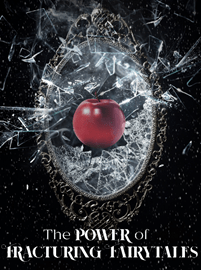Once upon a time… There is something inherently nostalgic about those words. They bring us back to childhood, when we were first introduced to fairy tales. For me, I’m brought back to a cold winter’s day. Not a weekend, but a weekday. I was supposed to be in school, but the back roads to my country house were so caked with freshly fallen snow my mom couldn’t get a foot down our driveway. So instead, I stayed in my pjs, made too many cups of hot chocolate (with marshmallows, of course), and curled up on the couch for a day of Disney moves (and Anastasia).
This day wasn’t my first introduction to fairy tales (don’t worry, it wasn’t Disney that first introduced me to them, either), but the reason I remember this day so vividly is that it was the day those fairy tales on my screen lost a bit of their magic. I remember yelling at the Prince in Cinderella for being so superficial the only way he could recognize the woman he danced with at the ball was by her lost slipper (which also would have fit more girls in the kingdom than just her, but that’s another issue altogether), being angry at Ariel for trading her one, precious voice for a man she didn’t know, and wondering why Sleeping Beauty fell for the first man to kiss her without her consent.
After yelling my annoyance at the screen, a secondary emotion hit me. Sadness seems too plain a term to define it. Nostalgia is maybe more accurate. Whatever that indescribable emotion was, it came from knowing I would never be able to view fairy tales as I did before I grew up and life got complicated.
Around this same time, I discovered the genre of fairy tale retellings or fractured fairy tales. This genre takes everything we know about traditional fairy tales and breaks them. There is a unique power in this breaking. As fairy tales were originally created to impart valuable life lessons to children, the breaking of such stories would seem to suggest a metamorphosis of these lessons. In a sense, these fractured fairytales have become the fairy tales of our modern world.
In my reading and watching of fractured fairy tales (such as Once Upon a Time, The Sister’s Grimm, and Amanda Lovelace poetry), there is one ‘fractured’ element that is consistently portrayed in most retellings. Unlike the passive princesses in early fairy tales, the women in fractured fairy tales often play an active role in their story as dynamic heroines instead of damsels in distress. If fractured fairy tales are in a sense the fairy tales of our modern world, it would make sense that the role of women would be a topic fractured fairy tales would want to unpack. While women’s rights and roles have always been a topic of discussion, it seems that within the past few years there has been a resurgence of advocacy on the topic. We’ve hit some major mile stones, including the recent 100th anniversary of women receiving the right to vote in the United States, but even with this cause for celebration, there is still progress to be made. This anniversary, while a victory for all women as a step in the right direction, only marks the anniversary of white women receiving the right to vote. Women of other races and ethnicities fought long and hard for the right to use their voices for many years after the 19th amendment was passed.
What all of this tells me is that I was not the only little girl to grow frustrated with fairytales. All around the world, all across time, other girls have felt discontent with what the world told them to be or want for their lives. That discontentment gave women the right to vote, took them out of the home and into the work place, helped them rule kingdoms and make history.
I don’t hate fairytales. Several years removed from that day, I can appreciate them for what they are and what they meant to me when I was young. So if you’re there right now where I was on that cold winter’s day or you feel stuck in your circumstances and discontent, rewrite the script. Find ways to fracture the fairytale of your own life and strive for the kind of life you want to live, a life you can be proud of. There is a power in the breaking that creates so much potential. Don’t be afraid to tap into that potential and wield it because your choice to play the heroine instead of the damsel may be just the thing that inspires the next women feeling stuck to do the same.
-Emily VanderBent
Junior Girl
Girl Museum Inc.

